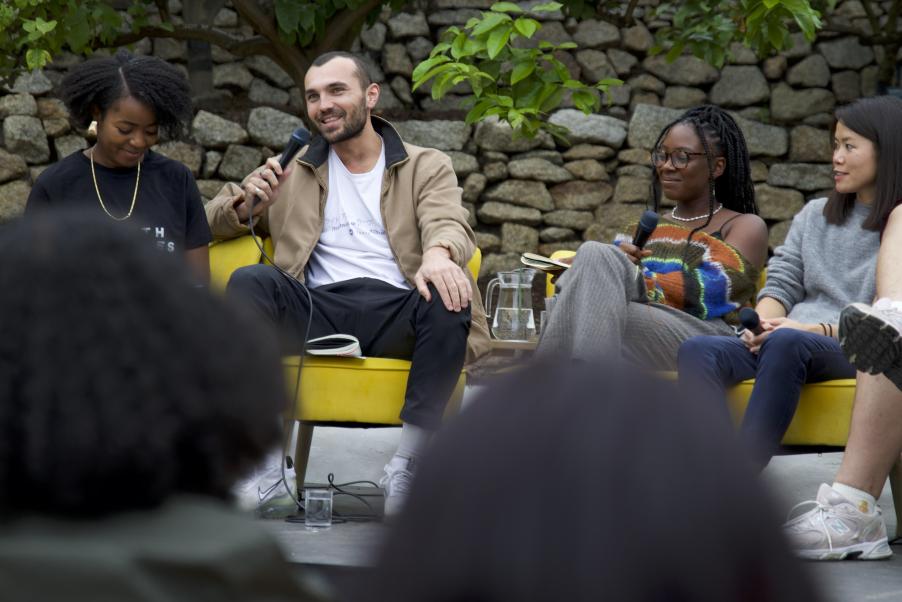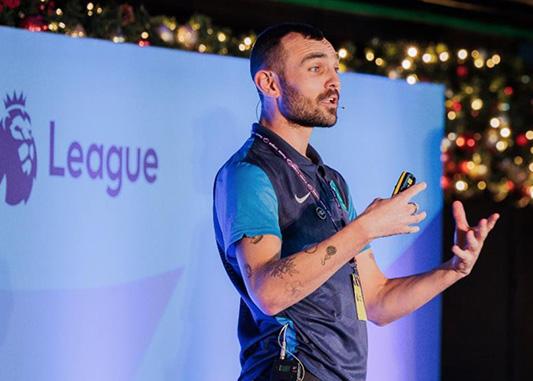The Together Towards Tomorrow challenge is, at its core, about building a future where everyone can thrive. A world in which every young person understands their ability to lead, create change and have a positive impact on their communities. To get there, we need to change how we teach young people to show up in the world. We need to bring people together, across generations, bringing their past wisdom and learning as well as their present energy and ideas to collaborate, to innovate and to transform their communities and build an alternative future. We must activate young people as leaders of change and give them the autonomy and confidence to lead with their innovations so they can become lifelong changemakers. This is how we can build a world where the solutions we have outweigh the problems we face.
To explore these ideas of intergenerational collaboration and activating young people as leaders, and to see how a challenge can help us achieve a world where Everyone is A Changemaker, we sat down with Elliot Arthur-Worsop, co-founder of Football for Future and winner of the Green Changemakers challenge. Football for Future uses the universal language of football to reach new audiences with climate change and sustainability education and to activate people of all ages to make a difference for our planet. We had an inspiring conversation about the impact of winning a challenge, what intergenerational collaboration means and looks like in practice and how Football for Future activates young changemakers.
Can you sum up your experience of being involved in an Ashoka challenge in 3 points?
It was a reflective process. I definitely got to consider the type of value that we deliver.
It was also strategically helpful, building on the last point, to really give clarity to how we operate and what our theory of change means and achieves.
Lastly, it was really inspiring to hear the stories of other change makers and how they're trying to drive impact in their respective spaces.
What has the impact of winning the challenge been for you guys?
It's supported us to recruit positions to be able to scale up our departments and to be able to scale up our impact. It was something that we had to invest wisely into different people and places. Obviously if you invest it in the right way then you get a return on that.
Amazing! So, the Together Towards Tomorrow challenge is all about intergenerational collaboration, and celebrating the ways in which people, all over the world are bringing people together across generations to create change. This is something that FFF does really well and I’d love to know what ‘intergenerational’ means to you?
Yeah, I think it means true collaboration. Collaboration in a way whereby voices across all ages are not only heard, but they're listened to. I think that means from a top down and bottom-up approach. It's not just about young people, it's also about older people. For example, sometimes we'll go into clubs and the younger people actually have got more of an idea about what climate change is; sometimes it's the older people who are working there, who, when they were in school, it wasn't on their academic agenda and being able to work with them and help them to understand what it is and what their position of power and responsibility is in a way that's not condescending or anything like that I think is also important. But yeah, intergenerational, I think it means just that, true collaboration across the age spectrum and with that comes different knowledges and different perspectives as well which is really important in terms of being able to create change that effects and involves all of us.
Incredible definition, I love that: true collaboration. So, can I ask about examples where you’ve seen the power of intergenerational collaboration play out?
So, we're doing a programme with the Premier League at the moment where we go and work with Academy players who are the young players at different football clubs and these guys don't necessarily have the agency to be able to create change around sustainability or have their voices heard. But that's where we come in, it's about being able to work with these young people and we do great workshops with them, and they come up with great ideas. That's all, well and good, but if those ideas don't go anywhere, then it’s sort of like what's the point? Or it can be a little bit disempowering for the young people, if they come up with ideas and they learn about something, and then that's where the journey ends for them. So, I think what beautiful, true collaboration looks like is when you can go in and work with these young people and then have the older people who do have positions of power within those organisations, respect and really listen and show the young people that they do have power and they do have autonomy to be able to create change and that their voices are heard.
For example, we've worked with some football clubs before, where we work with the young people and then they'll come up with an Instagram campaign for the club’s channels and that's great. But then it's about getting the senior people working in the team, to platform their messages to get them on the club social media accounts. So, you have the young people coming up with ideas, but then you do need the more senior people who are already in positions of power to work with them, to activate that in certain ways.
That's so true, so that’s this ‘true collaboration’ really playing out. People working together across generations to make that change happen.
In terms of giving young people agency, which is another point this challenge is really focusing on, what does that mean to you?
I think giving young people agency is incredibly important, especially when they're in their formative years. It's really important to make them realise that their voices do matter. I feel like the pedagogy of conventional education systems today doesn't really empower youth voices and then they will transition into their adult life without understanding the power that they do have to influence change, to be able to feel as though their voices matter and that it's appropriate for their voices to be in the same spaces as, older people who are sort of more well established within different institutions from a power perspective.
Personally, I never really had that as a young person, I was never told that my voice mattered or that my opinion mattered when it came to almost anything of significance or importance, which is kind of crazy. So, I think trying to disrupt that is a very radical approach to ensuring that young people do move forward with their lives, knowing that if they have something to say, that they know they should say it, and they know who to say it to and that their opinion is valid.
I completely agree. How do you make that happen? How do you make young people feel like they can share their ideas and opinions?
I think obviously everyone can be a changemaker, so you just need to create an environment where everybody in the room feels comfortable to say something in the first place. I think that's really important. Being able to create a culture and an environment where no one is scared to make mistakes because we all know that the best way to learn is through making mistakes in the first place.
So I think for us culture is everything. It’s creating an environment where no matter what the knowledge or skill level is in the room or the experiences are in the room, being able to let everyone know that their ideas are valid no matter what, and trying to create a culture of positivity where no one's afraid of failure and people are comfortable to share, what's on their minds, whether that's from an academic perspective or whether that's from a creative perspective.
I love that, it really is all about making people feel comfortable in the spaces they are in and they won’t be judged if they get it wrong. So, the last question from me is back to the challenge specifically, what advice would you give to someone applying?
That's a good question. I guess making sure that your mission really does complement the challenge and that the challenge really speaks to the very essence of what the mission of your organisation is.
And another important thing is making sure that you understand what your impact is. I know that often for smaller organisations that aren’t so established, it’s easy to talk about your ideas and your projects but you haven’t really measured your impact. So, making sure that you’re quantifying your impact, and you have data you can share around that.



